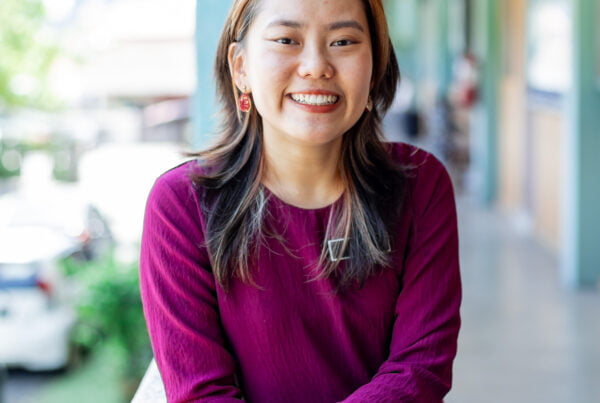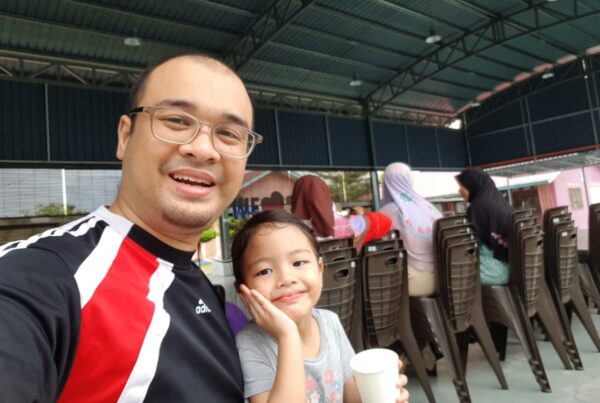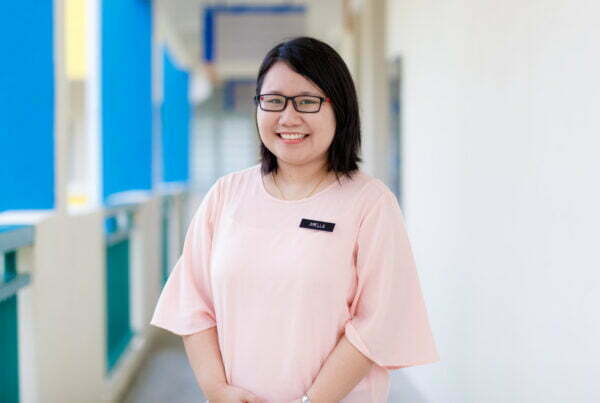“LDOs are Leadership Development Officers, and they are exactly what they sound like. They primary function is to help the Teach For Malaysia Fellows with classroom management, teaching tips and techniques, and everything else it takes to be a transformational leader in the classroom. All of TFM’s LDOs have a wealth of experience in teaching, and have taught in places all over the world, and all over Malaysia.
Fellows have a busy and challenging schedule. For the staff at TFM, LDOs are our first point of contact with the Fellows. They are the ones who know the Fellows best and most closely.
One good way to find out what an LDO does is by going on a school visit. ‘There are times when we are in the teacher-coach mode full swing, where we spend the entire day in schools observing lessons and having debrief conversations with Fellows,’ says Sawittri. ‘We also use this opportunity to speak to students to gauge their level of understanding and most importantly to get a clearer picture of how Fellows are doing in relation to their Big Goals (kids are always honest!).’ On Tuesday, I had the opportunity to follow Sawittri Charun on a school visit to see her Fellows, Deepa, Andrew and Connie.
We meet at the first school at 8.30am. Deepa’s Form 1 Geography class isn’t due to start for another half hour or so, so we group in the canteen and Sawittri gives us a briefing. She’s also briefed the Fellows beforehand, so they know to expect us. She talks about the Fellows that we’re going to be observing in a bit. She tells us a little bit about the challenges they and the school regularly face. The school has a poor attendance record, and even more so during the fasting month. When we meet Deepa later, she admits that despite her best efforts, she’s not certain how many kids will turn up today.
The class is well-attended, despite her fears. The students remain attentive throughout the lesson. After the lesson, Sawittri reminds Deepa about a debrief session after. ‘In debrief conversations, we attempt to diagnose any problems that Fellows may be experiencing in school and help them find the best solution for these problems,’ Sawittri explains to us. ‘I also like to use this time to build relationships with school administrators; it can be as simple as dropping by the office to say hello.’
While we wait for Deepa, Sawittri has debriefed us. She asks what we thought about the class, with special attention to the lesson plan. We’re quite hesitant about giving feedback at first, not having the special kind of training in education that Sawittri has. But Sawittri insists on our input. We talk about classroom management, and the methods she used to hold their attention. Deepa held the students’ attention well by starting off with a freestyle brainstorming assignment, we concluded. It engages the students immediately, and warms their minds up for the information that she’s about to give them. But her classroom management wasn’t the best: her students were eager participants, but they repeatedly shouted answers out of turn.
Sawittri agrees, and teaches us a bit about the different types of students we can find in a class: low-priority students, who are attentive and will probably perform well on their own; medium-priority students, who need a bit of prompting; and high-priority students, who skulk at the back of the class and need a bit of a push. Ideally, Deepa should have made an effort to call on at least one from each group of priorities.
Sawittri asked the Fellows if the Fellows have any tasks they need a hand with, so that we don’t just take up space in their classroom. While we’re working on some of the tasks, she keys in her observations on her Fellows, and schedules one-on-one meetings with them. She talks to us about some of the challenges that other Fellows face – lack of support from the school or parents can take its toll on the Fellows.
The next school is a different experience. The school’s challenge is just a lack of a community that is conducive for studying. Andrew and Connie are working hard to overcome this challenge by doing regular home visits, inviting the students to their homes for extra classes, and giving their contact details to their parents. The Fellows support each other too.
We watch Connie take on a class of rowdy Form 2 kids, teaching them English. Just like Deepa’s class, they’re fighting to answer questions.
“Calm down,” Connie says. “Okay, raise your hands on the count of three. One, two, THREE – ”
The classroom instantly becomes a sea of hands as everyone shoots their hands up. It’s quite amazing, and Sawittri glows with pride.
Teaching isn’t easy, and being an LDO isn’t either. Each LDO handles around 15 Fellows, and each Fellow has anywhere from 100-200 students under his or her care, with issues and circumstances unique to each one – any of which could require the help and advice of an experienced LDO. Sawittri knows the schedules of all her Fellows inside out, and how well they are performing. She travels all over the Klang Valley and beyond to keep tabs on their teaching performance.
Besides coaching and guiding Fellows, there are so many other tasks involved in being an LDO. ‘I am heavily involved in designing professional development opportunities for Fellows as well as training team members,’ explains Sawittri. ‘Preparation for Institute also begins months before Institute starts and this involves us researching for and designing sessions, running a leadership conference for Institute staff, and more.’
There’s a lot of thought and heart that goes into being an LDO – they support the Fellows, keeping the TFM vision alive.”




